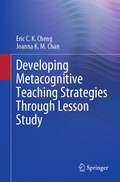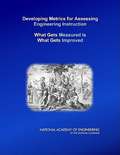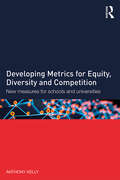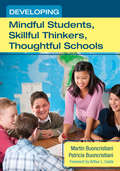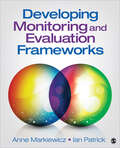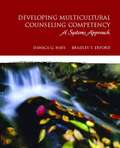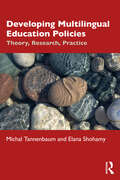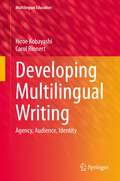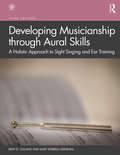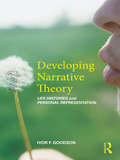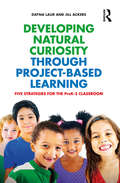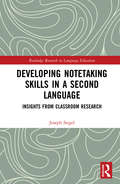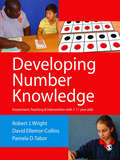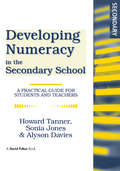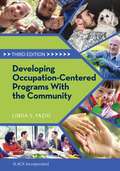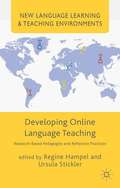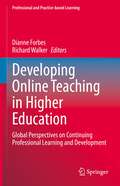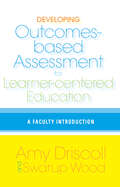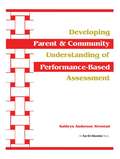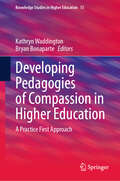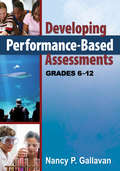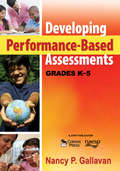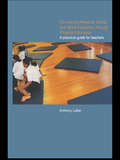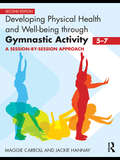- Table View
- List View
Developing Metacognitive Teaching Strategies Through Lesson Study
by Eric C. Cheng Joanna K. ChanThe book illustrates how Lesson Study can be applied to craft metacognitive teaching strategies to enhance students’ learning to learn competencies. Based on the findings of an empirical study of a university-funded teaching development project, this book reports how to apply Lesson Study and Learning Study to enhance teachers’ metacognitive teaching competencies with a view to tackling the impacts and challenges created by and underlying the learning to learn curriculum. The book allows readers to experience metacognitive learning by sorting the prior knowledge on the metacognition, setting the goal and planning reading schedule, checking their understanding and progress, evaluating what they have or have not learned and reflected on their reading experience and feelings. Readers can grasp the key concept underpinning metacognitive teaching, including teaching strategies for developing students’ metacognitive abilities that include working on problem-solving activities, working on small collaborative groups, making metacognitive and learning strategies explicit, and encouraging students to reflect upon and talk about their learning.
Developing Metrics for Assessing Engineering Instruction: What Gets Measured Is What Gets Improved
by National Academy of Enegineering National of the National AcademiesFaculty in all disciplines must continually prioritize their time to reflect the many demands of their faculty obligations, but they must also prioritize their efforts in ways that will improve the prospects of career advancement. The current perception is that research contributions are the most important measure with respect to faculty promotion and tenure decisions, and that teaching effectiveness is less valued--regardless of the stated weighting of research, teaching and service. In addition, methods for assessing research accomplishments are well established, even though imperfect, whereas metrics for assessing teaching, learning, and instructional effectiveness are not as well defined or well established. Developing Metrics for Assessing Engineering Instruction provides a concise description of a process to develop and institute a valid and acceptable means of measuring teaching effectiveness in order to foster greater acceptance and rewards for faculty efforts to improve their performance of the teaching role that makes up a part of their faculty responsibility. Although the focus of this book is in the area of engineering, the concepts and approaches are applicable to all fields in higher education.
Developing Metrics for Equity, Diversity and Competition: New measures for schools and universities
by Anthony KellyDeveloping Metrics for Equity, Diversity and Competition is a groundbreaking book in the field of educational research. Equity, diversity and competition are critical to our understanding of social justice and the provision of effective education for everyone, and this book develops a new coherent scientific approach to measuring them. New theory and methodologies based on previous research by the author are introduced in school and university settings. They are mathematical in nature, but have a wide range of applications within mixed-methods approaches and include: warranted weighting systems for constructing league tables game theoretic approaches to analysing power and influence indices for measuring equity in student attainment indices for measuring competition modelling the educational awards market calculating the optimal size of research groups measuring diversity. The book is an ideal resource for educational researchers, policy-makers and high-level practitioners, and those who want to explore the possibilities of using novel approaches to address the problems faced by schools, colleges and universities in the new education landscape.
Developing Mindful Students, Skillful Thinkers, Thoughtful Schools
by Martin Buoncristiani Patricia E. BuoncristianiLearning outside the box begins with a thought Grounded in the research of the best proponents of critical thinking and aligned to one of the key goals of the Common Core State Standards, this book shows school leaders how to build a thinking culture within the entire learning community. Included are numerous strategies for both teachers and leaders that demonstrate how to: Shape the school culture so that it promotes a common vision around thinking Create classroom conditions that help students become mindful thinkers Ask questions that develop skillful thinking Help students formulate questions that facilitate problem solving Work with parents to encourage skillful thinking in their children
Developing Monitoring and Evaluation Frameworks
by Anne Markiewicz Ian PatrickThis practical book provides clear, step-by-step guidance on how to develop a monitoring and evaluation framework in a participatory, logical, systematic, and integrated way. The authors outline the key stages and steps involved, including: scoping the framework; identifying planned results; using program theory and program logic; developing evaluation questions; identifying processes for ongoing data collection and analysis; determining means to promote learning; reporting; and dissemination of results. A final chapter focuses on planning for implementation of the framework, with reference to the broader program and organizational context. The authors draw on their extensive experience in developing monitoring and evaluation frameworks to provide examples of good practice that inform organizational learning and decision making, while offering tips and guidelines that can be used to address common pitfalls.
Developing Monitoring and Evaluation Frameworks
by Anne Markiewicz Ian PatrickThis practical book provides clear, step-by-step guidance on how to develop a monitoring and evaluation framework in a participatory, logical, systematic, and integrated way. The authors outline the key stages and steps involved, including: scoping the framework; identifying planned results; using program theory and program logic; developing evaluation questions; identifying processes for ongoing data collection and analysis; determining means to promote learning; reporting; and dissemination of results. A final chapter focuses on planning for implementation of the framework, with reference to the broader program and organizational context. The authors draw on their extensive experience in developing monitoring and evaluation frameworks to provide examples of good practice that inform organizational learning and decision making, while offering tips and guidelines that can be used to address common pitfalls.
Developing Multicultural Counseling Competency: A Systems Approach
by Danica G. Hays Bradley T. ErfordThis text is an innovative, evidence-based approach to facilitating students' journey to becoming multiculturally competent counselors. Comprehensive, thoughtful, and in-depth,Developing Multicultural Competence goes beyond general discussions of race and ethnicity to include discourse on a broader, more complex view of multiculturalism in clients' and trainees' lives. Both scholarly and highly interactive, this new text strives to present trainees with empirically-based information about multicultural counseling and social advocacy paired with engaging self-reflective activities, discussion questions, case inserts, and study aids, creating opportunities for experiential learning related to cultural diversity considerations and social advocacy issues within clients' social systems. Addressing CACREP (2001/2009) Standards related to the Social and Cultural Diversity core area, the book is broken into four parts: Part One covers key concepts and terms regarding multicultural constructs and cross-cultural communication; Part Two defines social advocacy and identifies the major forms of oppression; Part Three discusses the major cultural and diversity groups; and Part Four develops trainee skills for working with diverse clients, including infusing multiculturalism in how they conceptualize, evaluate, and treat these clients.
Developing Multilingual Education Policies: Theory, Research, Practice
by Elana Shohamy Michal TannenbaumMultilingual policies are increasingly important and required in educational settings worldwide, yet a solid experimental body of theory, research, and practice providing guidance for the development of policies is lacking. The Israeli context presented in this book serves as a case study or a model that could be used by bodies or entities seeking to devise a multilingual policy. The authors begin by addressing the general notion of a multilingual education policy with specific reference to the Israeli context. The book then focuses on specific challenges confronting the new policy that have been explored in empirical studies, and concludes with a proposed framework for a new multilingual education policy related to the core theoretical topics and empirical findings discussed in the previous chapters. This framework includes principles and strategies for implementing the process described in the book in other contexts, ensuring wide applicability and relevance. Developing Multilingual Education Policies: Theory, Research, Practice is an essential read for all involved in language policy and planning within applied linguistics and education.
Developing Multilingual Writing: Agency, Audience, Identity (Multilingual Education #42)
by Hiroe Kobayashi Carol RinnertWith millions of people becoming multilingual writers in the globalized digital world, this book helps to empower writers to connect with their readers and project their identities effectively across languages, social contexts, and genres. In a series of closely-related studies that build on each other, we look comprehensively at how writers develop their ability to construct meaning for different audiences in multiple languages. This book, which draws on various approaches (including a social view of writing, multicompetence, adaptive transfer, complex systems theory, motivation, and translanguaging), contributes to on-going efforts to integrate differing approaches to multilingual writing research. This book focusses on how writer agency (control over text construction), audience awareness (ability to meet expectations of prospective readers), and writer identity (projection of image of the writer in the text) progress as multilingual writers gain more experience across languages. The within-writer, cross-sectional text analysis (Chapters 2-5) examines 185 essays written in Japanese and English by eight groups of writers from novice to advanced (N=103), supplemented by insights from these writers’ reflections. We explore how they employ three kinds of text features (discourse types, metadiscourse, and self-representation), which relate to their developing agency, audience, and writer identity in their text construction, and propose a new model for writer voice construction based on those features. The four case studies (Chapters 6-9) focus on five university students and six professionals to examine closely how individual writers’ agency, audience, and identity are interrelated in their text construction in two or three languages and diverse genres, including academic and creative writing. The combined studies provide new insights into multilingual writing development by revealing the close interrelationship among these three principal aspects of writing across languages. They also demonstrate the writers’ multi-directional use of dynamic transfer (reuse and reshaping) for L1, L2, and L3 text construction, and the use of mixed languages L1/L2 or L1/L3 (translanguaging) for composing processes, in addition to the creative power of multilingual writers.One significant contribution of this book is to provide models of innovative ways to analyze text and new directions for writing research that go beyond complexity, accuracy, and fluency. Categories and detailed examples of text features used for writer voice construction (e.g., specific characteristics of Personal, Emergent, and Mature Voice) are helpful for writing teachers and for developing writers to improve ways of conveying their own intended writer identity to the reader. The studies break new ground by extending our analysis of L2 writing to the same writers’ L1 and L3 writing and multiple genres.
Developing Musicianship through Aural Skills: A Holistic Approach to Sight Singing and Ear Training
by Kent D. Cleland Mary Dobrea-GrindahlDeveloping Musicianship through Aural Skills, Third Edition, is a comprehensive method for learning to hear, sing, understand, and use the foundations of music as part of an integrated curriculum, incorporating both sight singing and ear training in one volume. Under the umbrella of musicianship, this textbook guides students to "hear what they see, and see what they hear," with a trained, discerning ear on both a musical and an aesthetic level. Key features of this new edition include: Revised selection of musical examples, with added new examples including more excerpts from the literature, more part music, and examples at a wider range of levels, from easy to challenging New instructional material on dictation, phrase structure, hearing cadences, and reading lead sheets and Nashville number charts An updated website that now includes a comprehensive Teacher’s Guide with sample lesson plans, supplemental assignments, and test banks; instructional videos; and enhanced dictation exercises The text reinforces both musicianship and theory in a systematic method, and its holistic approach provides students the skills necessary to incorporate professionalism, creativity, confidence, and performance preparation in their music education. Over 1,600 musical examples represent a wide range of musical styles and genres, including classical, jazz, musical theatre, popular, and folk music. The third edition of Developing Musicianship through Aural Skills provides a strong foundation for undergraduate music students and answers the need for combining skills in a more holistic, integrated music theory core.
Developing Narrative Theory: Life Histories and Personal Representation
by Ivor F. GoodsonWe live in an age of narrative: life stories are a crucial ingredient in what makes us human and, in turn, what kind of human they make us. In recent years, narrative analysis has grown and is used across many areas of research. Interest in this rapidly developing approach now requires the firm theoretical underpinning that would allow researchers to both approach such research in a reliably structured way, and to interpret the results more effectively. Developing Narrative Theory looks at the contemporary need to study life narratives, considers the emergence and salience of life narratives in contemporary culture, and discusses different forms of narrativity. It shows in detail how life story interviews are conducted, and demonstrates how the process often begins with relatively unstructured life story collection but moves to a more collaborative exchange, where sociological themes and historical patterns are scrutinised and mutually explored. At the core of this book, the author shows that, far from there being a singular form of narrative or an infinite range of unique and idiosyncratic narratives, there are in fact clusters of narrativity and particular types of narrative style. These can be grouped into four main areas: Focussed Elaborators; Scripted Describers; Armchair Elaborators; and Focussed Describers. Drawing on data from several large-scale studies from countries across the world, Professor Goodson details how theories of narrativity and life story analysis can combine to inform learning potential. Timely and innovative, this book will be of use to all of those employing narrative and life history methods in their research. It will also be of interest to those working in lifelong learning and with professional and self development practices.
Developing Natural Curiosity through Project-Based Learning: Five Strategies for the PreK–3 Classroom
by Dayna Laur Jill AckersDeveloping Natural Curiosity through Project-Based Learning is a practical guide that provides step-by-step instructions for PreK–3 teachers interested in embedding project-based learning (PBL) into their daily classroom routine. The book spells out the five steps teachers can use to create authentic PBL challenges for their learners and illustrates exactly what that looks like in an early childhood classroom. Authentic project-based learning experiences engage children in the mastery of twenty-first-century skills and state standards to empower them as learners, making an understanding of PBL vital for PreK–3 teachers everywhere.
Developing Notetaking Skills in a Second Language: Insights from Classroom Research (Routledge Research in Language Education)
by Joseph SiegelDeveloping Notetaking Skills in a Second Language combines theoretical perspectives with an analysis of empirical classroom studies and offers a detailed discussion that increases pedagogical awareness of factors impacting second language (L2) notetaking performance and instruction. Based on original research and including descriptions of classroom practices and samples of student work, the book provides insights on a range of topics relevant to L2 notetaking. The book emphasizes the challenges that many students from different international backgrounds face when taking notes in an L2 and outlines a five-stage pedagogic cycle for notetaking that can be applied to any listening text. It also explores the dialogic potential of notes for stimulating class discussion about notetaking strategies. This book will be of great interest for teachers, academics, scholars, and postgraduate students in the fields of applied linguistics, L2 and foreign language education. It will also be a useful resource for those in charge of teacher education and postgraduate TESOL, L1, and L2 listening researchers and psycholinguists.
Developing Number Knowledge: Assessment,Teaching and Intervention with 7-11 year olds (Math Recovery)
by Robert J Wright Pamela D Tabor David Ellemor-CollinsFollowing the great success of the earlier books, this fourth book in the Mathematics Recovery series equips teachers with detailed pedagogical knowledge and resources for teaching number to 7 to 11-year olds. Drawing on extensive programs of research, curriculum development, and teacher development, the book offers a coherent, up-to-date approach emphasising computational fluency and the progressive development of students′ mathematical sophistication. The book is organized in key domains of number instruction, including structuring numbers 1 to 20, knowledge of number words and numerals, conceptual place value, mental computation, written computation methods, fractions, and early algebraic reasoning. Features include: fine-grained progressions of instruction within each domain; detailed descriptions of students′ strategies and difficulties; assessment tasks with notes on students′ responses; classroom-ready instructional activities; This book is designed for classroom and intervention teachers, special education teachers and classroom assistants. The book is an invaluable resource for mathematics advisors and coaches, learning support staff, numeracy consultants, curriculum developers, teacher educators and researchers.
Developing Numeracy in the Secondary School: A Practical Guide for Students and Teachers
by Howard Tanner Sonia Jones Alyson DaviesAs the National Numeracy Strategy (NNS) extends into secondary schools this book for trainee and practicing mathematics teachers provides practical guidance on developing effective strategies for the teaching of numeracy at KS3 and 4 based on the DfEE requirements. The teaching and learning approaches suggested in the NNS are analyzed and explained using case-study examples from secondary schools. Many of these ideas were developed by teacher inquiry groups in the Raising Standards in Numeracy project. The book includes examples of pupils' work; lesson plans and pupil activities; ideas for using ICT to enhance mathematics; teacher guidance on both teaching and assessment; and ideas for developing numeracy across the curriculum. This book offers an introduction to the subject of numeracy accompanied by lesson ideas and practical guidance. It will prove a valuable resource for all trainee and new mathematics teachers.
Developing Occupation-Centered Programs with the Community
by Linda S. FazioThe Third Edition includes new and updated content on evidence-based practice; program evaluation at multiple levels; funding; nonprofits and social entrepreneurship. Additionally, new trending issues of interest to programmers include human trafficking, post-combat programming for military veterans and their families, arts-based programming for all ages, and programming to meet current needs of the well-elderly. The features of the Third Edition are: Workbook format offers the instructor and the student options for how to use the text in a classroom or independently in an internship or residency. <P><P> The order of the programming process, chapter content order, summaries, and format of exercises has been retained to ease transition for instructors using previous editions of the text. The program “story” section has been retained, along with author’s notes on what is currently happening with these programs and other related topic areas. New content has been added in program sustainability, the assessment and building of community assets, and consensus organizing in communities. More developed content is offered about the structure and function of nonprofit organizations as well as the role and function of the social entrepreneur who does programming for these organizations.
Developing Online Language Teaching
by Regine HampelWhen moving towards teaching online, teachers are confronted every day with issues such as online moderation, establishing social presence online, transitioning learners to online environments, giving feedback online. This book supports language teaching professionals and researchers who are keen to engage in online teaching and learning.
Developing Online Teaching in Higher Education: Global Perspectives on Continuing Professional Learning and Development (Professional and Practice-based Learning #29)
by Richard Walker Dianne ForbesThis book serves as a reference point to inform continuing professional learning and development (CPLD) initiatives at both individual and institutional levels. It serves as a guide for faculty engaged in online teaching within the higher education sector, in universities and vocational education institutions. It moves beyond a technology-driven approach by emphasising pedagogy and design as key issues in online teaching practice. It will highlight challenges to staff engagement and how they may be overcome, drawing on evidence-based examples and models of CPLD from institutions around the world. It is underpinned by a framework that emphasises the need for CPLD that is sustainable and adaptable to a range of contexts, particularly in professional learning and development. This book also highlights practices aimed at sustainable, continuing, learning, and brings together a range of solutions and suggestions to assist educators and institutions with CPLD.
Developing Outcomes-Based Assessment for Learner-Centered Education: A Faculty Introduction
by Amy Driscoll Swarup WoodThe authors--a once-skeptical chemistry professor and a director of assessment sensitive to the concerns of her teacher colleagues--use a personal voice to describe the basics of outcomes-based assessment. The purpose of the book is to empower faculty to develop and maintain ownership of assessment by articulating the learning outcomes and evidence of learning that are appropriate for their courses and programs. The authors offer readers a guide to the not always tidy process of articulating expectations, defining criteria and standards, and aligning course content consistently with desired outcomes. The wealth of examples and stories, including accounts of successes and false starts, provide a realistic and honest guide to what's involved in the institutionalization of assessment.
Developing Parent and Community Understanding of Performance-Based Assessment
by Kathryn AlvestadThis book takes the reader step-by-step through the process of helping parents understand the role of performance-based assessment in student learning. Included are suggestions about what to emphasize during one-to-one meetings with parents, speeches and presentations you can deliver at PTSA meetings and school board sessions, transparency masters and handouts to enhance your presentations.
Developing Pedagogies of Compassion in Higher Education: A Practice First Approach (Knowledge Studies in Higher Education #15)
by Kathryn Waddington Bryan BonaparteThis collection addresses intersections and gaps between practice, theory, and research that both connect and divide compassion and pedagogies. In foregrounding practice, it makes an important contribution to the growing call for universities and educators to adopt inclusive student-centred approaches that challenge us to fundamentally re-think what universities do. It celebrates the role of students as co-creators of knowledge, locating them at the heart of what pedagogies of compassion in higher education should feel like and look like. It examines how compassion can become both critical and strategic in order to disrupt systems and orthodoxies that are no longer fit for purpose in a post-pandemic world. The ultimate goal the book aims to address is the need for humane universities driven by compassion, rather than profit, which can help to build fairer and more socially just societies. The book extends the theoretical and practical discussions of compassion as a fundamental organizing principle in higher education. It brings fresh interdisciplinary thinking, theories and approaches including the neuroscience of compassion, classical Eastern philosophies, intersectional compassion, sustainability, and environmental stewardship. It also includes critical reflection on experiences, challenges, barriers, and enablers, across multiple levels and perspectives. These range from reflections on compassion in the classroom to compassion in the boardroom, as well as in the many other spaces and places where learning occurs. It offers a creative collection of essays on compassionate practices in higher education, and appeals to anyone who is concerned about the moral standing of the university. ‘For some time now, we have been told that universities must be viewed on the business model, but this has only discouraged faculty, students and staff. As the contributors show, however, the very idea that teaching and educational practices could be more closely linked to compassion is definitely appealing, and it gives us a more inspiring way of thinking about the university of the future.’ Richard J. White, Creighton University, Omaha, NE, USA
Developing Performance-Based Assessments, Grades 6-12
by Nancy P. GallavanThis book guides educators through an assessment process that is fully integrated with the daily curriculum and designed to significantly improve student performance.
Developing Performance-Based Assessments, Grades K-5
by Nancy P. GallavanThe author's eight-point cultural compass guides you in crafting a respectful and inclusive curriculum. Each chapter includes frequently asked questions, specific strategies and activities.
Developing Personal, Social and Moral Education through Physical Education: A Practical Guide for Teachers
by Anthony LakerPersonal, social and moral development through physical education and sport is a relatively under-researched area. Most teaching concentrates on the performance aspect of physical education, while the National Curriculum requires teachers to address a number of 'non-physical' outcomes such as learning rules, teamwork, cooperation and competition. This timely book redresses that balance by providing classroom practitioners and student teachers with practical advice, and tried-and-tested suggestions for activities and strategies to help them use physical education as an effective vehicle for the all-round personal development of the individual. Tony Laker pays particular attention to: * curriculum development, planning units of work and lesson planning* considering different types of assessment, and suggestions on which forms are most appropriate for measuring programme effectiveness and the personal development of pupils* the role of the reflective practitioner and a framework within which teachers can reflect on their practice. Through using an extensive range of diagrams, photos and bulleted lists, Laker makes this guide a concise and accessible read, giving practitioners the opportunity to extend and develop their abilities in teaching this subject.
Developing Physical Health and Well-Being through Gymnastic Activity (5-7): A Session-by-Session Approach
by Maggie Carroll Jackie HannayHow can you make gymnastics activity fun, lively and inclusive? How can you improve the health and well-being of all your children? How can you ensure progression over time? This practical and easy-to-use teacher’s guide is the brand new edition of the popular workbook Movement Education leading to Gymnastics 4-7. It takes a session-by-session approach to teaching physical development and well-being through gymnastics for the five to seven age range. Fully updated with the most current schemes of work to use at Key Stage 1, it sets out a series of forty sessions over the two year span, to give you planned and logical progression of both content and advice. This one-stop resource includes twenty session plans per year group, which you can follow as a complete course or dip into for ideas and inspiration. It also includes Specific Skills Guide to help you support children in developing the correct techniques. Each session plan includes: learning objectives assessment criteria teaching approaches warm up and cool down activities the content of the session apparatus needed health and safety considerations. The companion volume, Developing Physical Health, Fitness and Well-Being through Gymnastics 7-11 follows the same format, and together, these user-friendly books provide a progressive programme of work from Years 1-6. If you are a practising or student teacher, this guide will give you all the confidence you need to teach gymnastics in your school.
